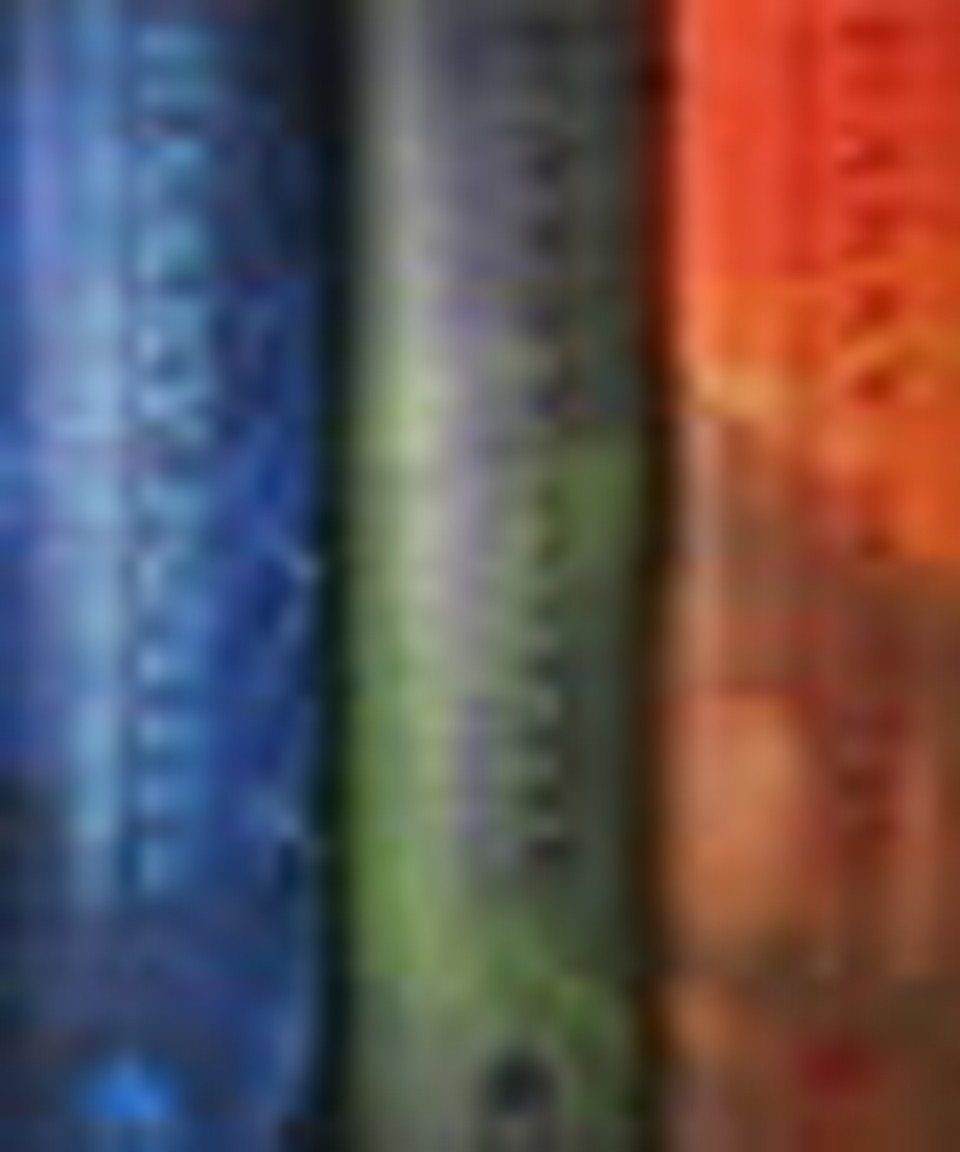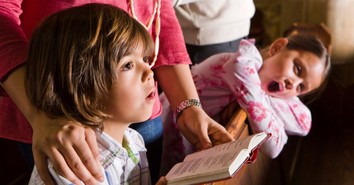SPOILER WARNING - This blog, in an effort to describe what changed the writer's mind about the Harry Potter series, reveals some crucial details about the final book and the very end of the series.
Asked earlier today via a poll on one of our Facebook pages, "Can one be a Christian and still enjoy reading/watching the Harry Potter series?" (current tally: 556 Yes, 273 No, 114 Undecided/Don't Care), I gave the following answer:
I'd argue two things: first, that Christians can perhaps get MORE enjoyment out of this series than can non-believers and pagans (somewhat evidenced by atheists who stuck with the series only to raise their ire at Ms. Rowling for having told them a Christian allegory), and second, that one can be a Christian and get something out of just about any story if he or she knows what to look for (there are exceptions; if you want a fantasy story you can really be bugged about, read this one).
With any tale, fiction or non-fiction - including ones a friend or a new acquaintance (or an enemy?) may sit down to tell you in a coffee shop or at the office - there are real issues, real sins, real victories, real hope. Elements of the 'Great Story' waiting to be discerned.
I used to decry the Potter series, but did a U-turn after I was confronted with the immense numbers of Christian readers I respected who were raving about it; surely they must have found something in there, a conclusion I reached since I refused to cop to the highly illogical "well, they're all just a bunch of self-interested, postmodern compromisers who make me sad for the state of the church and I'm the last bastion defending rightness" excuse.
So, begrudgingly - and prayerfully - I read. The first few books had some positive themes, and the story was certainly enjoyable, but that wasn't enough. But when I got to books 5, 6, 7, how often did I have to stop reading momentarily because I was laughing or tearing up with joy and utter amazement at a sentence (or even in two cases, an actual Bible verse!) which was an unmistakable parallel to the story of Jesus, our salvation, sacrifice, love, and even why and how God doesn't always reveal everything to us exactly how we want it?
What's more, when I read the Bible, I could choose to marvel at the inappropriateness or R-ratedness of some of the stories or themes, and yet, because I know the ending, and because I know a perfect God told his tale despite and through flawed and sinful people whom he loved anyway, I press on joyfully, more aware then that every person's story I come across from now on is going to be full of those same elements, both good and bad.
And in 'The End' - both in Our Story and in the Potter books - there is true magic: not witchcraft (ultimately a mere vehicle for power and choice in Potter), but something far greater, far more ancient, far more wonderful and victorious.
Now, it's true, there aren't many direct references to "God" in Potter, but there are holidays like Christmas, and it's also obvious that there is a "Greater Magician" (my term) above the fray, one who would have designed the rules about such crucial plot points as sacrifice, love, remorse/repentance and fulfillment of prophecy.
And what about those Bible verses I mentioned?
I'll leave that to my friend the Rev. Torey Lightcap to explain:
Rowling’s theology is a bit of a boiled-down feast. For her, life is summed up well in three pieces of Scripture, two of which she chooses to quote in one chapter [of Deathly Hallows] and gloss in the rest of the book; and the last of which simply hovers invisibly over the entire Potter project.
The first two quotations appear on the headstones of long-deceased but plot-essential persons: “Where your treasure is, there will your heart be also” (Matthew 6:21) and “The last enemy that shall be destroyed is death” (1 Corinthians 15:26). The third, as I say, is an implication, hidden, as it were, in plain sight: “Greater love hath no man than this, that a man lay down his life for his friends” (John 15:13).
We must know at some level that these pearls represent choice moments in Rowling’s faith life, that indeed this is her canon-within-the-canon, and nuggets to which she attaches the highest signification. We know them to be so palpably true for her because they are all over each of the seven books. Taken together, they are a powerful pastiche of Christian theology from the quills of Paul and John and Matthew: death has no dominion; self-sacrifice is the highest good; give to the things that matter, because you will become those things. Love, indeed, is stronger than death – and we need to believe that if we’re going to practice it; and the more we practice, so all the more will we believe.
So why have we Christans gotten so upset over the years? Why are some users wondering why our site isn't giving more time to the anti-Potter argument? Well, first, I'd suggest the "anti-" argument - while legitimate - isn't very deep, and therefore doesn't make for good articles. It's pretty much one sentence long: "The kids attend Hogwarts School of Witchcraft(!) and Wizardry. Period. End of story." And... that can indeed be the end of the story if you want it to be. No witchcraft -- definitely a good idea. It's why I don't practice any. Nor is Wicca nor the Occult what we see being used in these stories.
The other reasons for the uproar I believe center around the fact that the stories are first and foremost aimed at kids (and let's face it, we deeply resent peer pressure and school pressure telling our kids to read something that we either have misgivings about, or lack the time or interest to get to the bottom of), and because of a lot of misinformation, such as the unfounded stories that Rowling is a witch (she's Church of Scotland, actually), or that the books caused a huge surge in children pursuing Wicca (where's the data? Or the Post Hoc logic?), or that the story was only 1/7th or 2/7th's old when we first got all hot and bothered, and those old feelings are hard to shake even when the ending turns out to be quite special.
So... what have I done with my own children regarding this series? My son is 8, my daughter nearly 6. He and I have read the first two books together. I have let them both watch the first film. Beyond that, almost by mutual agreement, they're not ready. There is wisdom in fairness and moderation and patience most times, I think. (Incidentally, my friend Fred Alberti has what I think is a great rule for his six children: you can read Book One when you're the same age as Harry is in Book One -- 11. As Harry gains a year with each of the seven books, so do you).
When my kids are ready, for this series as well as Narnia and Lord of the Rings, I can hardly wait to have discussions with them. In the meantime, I'll continue to raise them on the True Story of good-over-evil, of the defeat of sin and the devil, of how they can become children of the King... while also steering them away from the parts of THAT story they aren't quite ready to understand (see: Bathsheba, Noah's daughters, Potiphar's Wife, the destruction of Sodom, David's dismemberment of certain Philistine body parts, Saul summoning Samuel's ghost, the brutality of watching Passion of the Christ, etc.) until they're a mite older.
Don't fear what you don't understand; don't eternally condemn something before the complete tale is told (good thing this is how God approached the story of Me). Yes, BE discerning, in both directions. Speaking of which...
There is another spiritual issue the Potter books caused me to muse upon regarding a vein of Christianity in which I was raised, and that is the name-it-claim-it, Word-Faith variety.
See, I had been taught growing up to fear things like books, any music with a rock-and-roll beat, death, and sickness. I was taught that prayers must be prayed the right way, at right times, or else you were leaving yourself open for regular attack. That failure to be completely healthy was a weakness of your own, probably in the faith or wrong-doing department. That there were doctrines regarding our lifespan to be crafted out of verses such as Psalms 90:10, such that if you didn't live to 70+, there was something wrong with your "magic." That we could numerate for ourselves the day and hour of the second coming. That God is not sovereign, but instead, will always do what we want if we wave our wand in precisely the right way. In other words, it's like we're the ones in the driver's seat.
If ever there was a spirit of witchcraft to be avoided, if ever there were "incantations" that must be uttered just right lest they not work, if ever there was a Voldemort-ian spirit of fearing not being in control or of getting ill or of dying... being raised to believe such was it. I didn't need to go to the Harry Potter books to find that brand of fearful spell-casting, though find it I did... in the bad guys of the series. Reading these books gave me yet another way to think about spiritual misunderstanding and misuse of power, even among those who believe, as well as the fearful loathing of the wrong things that gets us so off track.
***
Additional thoughts written in response to reader comments:
Chris Nelson
Tell me Shawn, where in the Bible is sorcery and witch craft endorsed. It is one of the most evil of sins and it is silly to think we can dabble in it and have any witness whatsoever.
Shawn McEvoy · Managing Editor, Crosswalk.com at Crosswalk.com / Salem Web Network
Right, it's why I don't dabble in it. But... can you show me where in Harry Potter real sorcery and real witchcraft are happening? All I'm trying to let folks know is that a lot of us had this wrong. I wouldn't for a second defend something completely indefensible and evil. If you want to be free of hating Harry Potter and J.K. Rowling, and getting huge knots in your stomach over what you may have heard 10 years ago, you not only can be, but should be. The story in total is a beautiful Christ tale. And not just a little bit. Majorly. As mentioned, actual Bible verses and themes are incorporated. So much so that a lot of atheist fans of the series got really ticked off at the author after the final book. A savior walks selflessly to a sacrificial death, is resurrected by a miracle the devil character does not and can not understand. After which, his curses against those the savior died to save are no longer binding. It's uncanny. Does that mean you have to read it? Not for a second. But one thing that, sadly, does not surprise me in the least is how NONE of the feedback I or others who have written on this topic have ever received goes like this: "Wow, really? It says that? The story goes there? And loads of fellow believers have noted the same? Man that'd be cool to see in a book that so many have read... maybe I need to reconsider..." In other words, everyone's already got their mind made up, and dug in their heels, chosen a hill to die on. But what if that hill isn't even a hill? Wouldn't you want to know? What if our passion would be better placed elsewhere? Maybe even in talking to unbelievers who have read the series and asking, "Did you happen to understand what you just read?" Just a thought.
***
I'd never presume to tell anyone what they have to read, or what they should force upon their children against their better judgment or proddings from the Holy Spirit. But it's that same Spirit that, at one time, kept me from delving into these books, and later, when I was ready to read them, helped me see the story that Rowling ultimately admitted is the one she always knew she was telling - the Christian one. I marvel that so many can not even know what they're against, or running from, or denouncing... yet do so anyway. Passionately. If only we had that kind of passion to feed the world...
***
I don't think that I said there's no witchcraft in the stories, rather that 1) what happens at the end involves a "magic" that is more similar to the miracles of the Resurrection and salvation story than anything to do with wands and wishes, and 2) the spells and "witchcraft" depicted here are made-up, fictional, more like special skills, very much like the "Force magic" used by Jedi Knights, very much like the mutant powers exhibited by the X-Men. And in all these cases, the powers are something one is born with and must decide whether to use for good, not something someone seeks out, not what one would encounter if one were a practicing witch. As one spokesperson for Wicca stated, "Harry Potter is to Wicca what Luke Skywalker is to Christianity." Not exactly a close connection.
***
As to the question of whether or not I and others have "read into" the books elements we wanted to see, all I can say is that it would have taken a lot to make me do the 180 I did... and that those elements were indeed present; the very things that caused me to laugh out loud and shake my head at times. And in any case, the world of literary criticism is all about the worldview lenses we all bring with us to texts. I once had a conversation with someone who was bothered that I'd cherished Shel Silverstein's The Giving Tree because in her view it was not "a Christian book." I had no answer to that, only to what I'd seen in it:
Complete love to the point of emptying. Unquestioning sacrifice, even for someone who isn't appreciating or understanding what they've been given... An entering into final rest fearing not death...
That's also what I found, and so much more, when I read Harry Potter, which far outstripped the fact that to tell the story the author created a secret world where people with special abilities gather, and happened to call these special skills "wizardry."
Originally published July 22, 2011.






